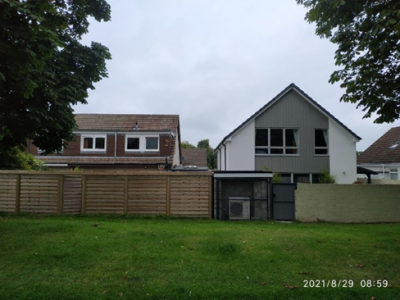ASHP noise complaints from my neighbour – what can I do?
1. Guildford Borough Council
2. When I bought the 12kW, I knew it was big... but I knew nothing then 🙂 The installers had specified 9kW, and I asked if I could future proof by going bigger.. Sure - no problem they said and dumped the behemoth on me. The 5kW outputs 6.8kW @-3 degrees at a 35 degree flow... might need a bit of extra heating if it gets colder than that.
Environmental Health felt they had a case. They wrote to me and said so, but they never issued a formal noise abatement notice.
The Sound Power Level of the LG 12kW was 63 vs the 5kW Vaillant at 51. So yes should have a large noise benefit. Also, if configured optimally through weather comp and running continuously the noise should be more even. The cycling of the 12kW introduced different tones all the time ramping up and turning off.
Additionally I suspect I will use a less electricity, so will watch closely. I've recently moved to Octopus agile with significant benefit as I have been running the DHW outside of the expensive period. Now to see if moving to 5kW makes it even cheaper
Posted by: @persephone...
Finally, I don't even think that ASHPs are green! They generate high and low frequency noise, they have fluorinated gases, and they consume a great amount of electricity most of which is still from fossil fuels!
...
@persephone, I'm a bit late to the party in adding to the explanation here, so apologies.
I've seen that others have already given explanations supporting the green credentials of ASHPs although talking of air source heat pumps as one generalisation is a bit like generalising about cars (wide range of technologies, sizes, intended applications and so forth). I would agree that when done badly an ASHP can be wildly inefficient and far from green whilst specified and installed correctly it can be a real game changer for the better. As a result, I'd like to briefly summarise before moving on to a point that hasn't been mentioned.
Firstly the gases. Just like another unit employing the same basic working principle (the refrigerator), many ASHPs do not use fluorinated refrigerants. Some common ones now used are propane or isobutane. My ASHP sadly does not and does indeed contain a fluoridated gas (R32 or difluoromethane). This demonstrates the point about not generalising, of course. The bottom line, however, is that proper disposal at the end of the unit's life is an important part of responsible ownership and that at the same time constant advances in design are moving away from higher impact gases.
Secondly, the noise. Each model of ASHP is different, so it is not just a matter of saying one is louder or quieter than another; the noise profile varies too. In addition, placement matters, so it is the end result that is the only practical criterion worth evaluating. As an example, my ASHP as installed is quieter than my fridge and the neighbours on that side of my house have taken the trouble to mention just how impressed they were with the unit's quiet running. No noise in any of the uncomfortable frequencies, no vibration-related noise, no discernable noise from ancilliaries. As I say, done well it can perform admirably.
Thirdly the consumption of electricity. Yes, they do consume a lot of electricity when working at full chat but the principle under which they operate still means the amount of energy they consume is far less than the heat delivered inside one's home (assuming, as ever, that the unit has been specified correctly and appropriately installed). ASHPs don't generate heat; they move it. They're only big fridges where, in my case, the effort of trying to cool down Surrey is heating my house. That's why it's reasonable to demonstrate that one unit of energy used to operate the ASHP produces three units of energy being dumped into the house. That efficiency may well vary (mine can drop down to 2.5 and go up well above three) but that's still way more efficient than the best gas boilers available since no gas boiler can get better than the theoretical maximum of one unit of energy in to one unit of energy out.
That third section on consumption of electricity is important, however, when discussing electricity generated from fossil fuels. When you consider that there are losses associated with delivering the electricity to your house, on average a gas fired power plant and associated delivery losses can manage about 40-45% efficiency. If an ASHP were powered completely by gas-generated electricity, therefore, it would still be about 20-25% more efficient use of that gas than a gas boiler. This is, of course, all playing with numbers and real world variations can still come into play, but it's a reasonable baseline.
However....
Not all electricity is generated from fossil fuels. We've all seen plenty of graphs about sources of energy for generating electricity but as a rough guide (based on 2020 data) fossil fuels accounted for about 41%, renewables about 43% and nuclear (I'll let you debate how green or dirty green that is) about 16%. That means ANYTHING electricity-powered is already significantly greener than a gas-burning equivalent assuming at least similar efficiency.
And this is where strategy becomes important, and there is an excellent TED talk on the subject (although you'll have to ignore the sometimes grating Americanised style of the video). The summary, however, is as follows:
- Governments have a limited amount of money to spend, so focusing on one solution is more efficient than multiple solutions - if, of course, you get it right.
- Switching as much as possible to run from the grid may or may not be beneficial immediately but any improvements you make to energy generation are immediately multiplied by the number of devices using that energy.
If we were to assume my ASHP is powered completely from the grid, every time someone comes up with a new way of replacing fossil fuel leccy with renewable leccy my ASHP becomes greener. All without me doing anything more. However, as it happens a significant number of people who install heat pump technology also install some form of renewable energy generation, and that home-grown energy can offset the energy appetite for an ASHP. I know of only one solution that could benefit gas boilers in the same way (i.e. home-generated gas to offset grid consumption) and that's the the HERU, but even then that's still in development and won't be available until 2025 at the earliest.
Of course, there's no getting away from the fact that one's choice of heating solution is largely irrelevant environmentally if what one is heating is poorly insulated. The best way to make a gas boiler greener is use it less and that holds true for an ASHP too.
105 m2 bungalow in South East England
Mitsubishi Ecodan 8.5 kW air source heat pump
18 x 360W solar panels
1 x 6 kW GroWatt battery and SPH5000 inverter
1 x Myenergi Zappi
1 x VW ID3
Raised beds for home-grown veg and chickens for eggs
"Semper in excretia; sumus solum profundum variat"
Is this the same as posts in the thread about MCS planning standards?
If so then several have tried to help but I think the bottom line was
Your neighbours development now has planning consent so you appear to have no case in planning law.
Your LPA has apparently rejected your claim of nuisance under environmental health law and unless you can prove them wrong against the test mentioned in the next paragraph, then they cant do anything.
You can sue for nuisance but you would need to convince a judge that your neighbour is 'substantially and unreasonably affecting the enjoyment of your property' or causing damage to your health? This is the same test that the local authority who must apply under Environmental Health law. Do you think you could do that?
Obviously I'm sorry to hear of your problems and I realise that the above isn't what you would ideally like to hear, but it's generally better to be realistic about these things if one is to avoid driving oneself mad.
Have I misunderstood somewhere?
4kW peak of solar PV since 2011; EV and a 1930s house which has been partially renovated to improve its efficiency. 7kW Vaillant heat pump.
@jamespa yes it is.
Get a copy of The Ultimate Guide to Heat Pumps
Subscribe and follow our YouTube channel!
@ericdo it has been a while since we received an updated on your issue. Can you please let us know what happened?
Get a copy of The Ultimate Guide to Heat Pumps
Subscribe and follow our YouTube channel!
- 27 Forums
- 2,495 Topics
- 57.8 K Posts
- 404 Online
- 6,220 Members
Join Us!
Worth Watching
Latest Posts
-
RE: What determines the SOC of a battery?
@batpred I didn't write the Seplos BMS software, I a...
By Bash , 1 minute ago
-

RE: Electricity price predictions
Sorry to derail this thread ‘slightly?’ but back to the...
By Toodles , 10 minutes ago
-

RE: Humidity, or lack thereof... is my heat pump making rooms drier?
Without knowing it, @andrewj, you've laid down the gaun...
By Majordennisbloodnok , 29 minutes ago
-
RE: Testing new controls/monitoring for Midea Clone ASHP
@tasos and @cathoderay thanks. I have some history grap...
By benson , 34 minutes ago
-

I am having my existing heat pump changed to a Vaillant...
By trebor12345 , 1 hour ago
-
Our Experience installing a heat pump into a Grade 2 Listed stone house
First want to thank everybody who has contributed to th...
By Travellingwave , 1 hour ago
-
RE: Setback savings - fact or fiction?
@cathoderay The input power is largely determined by...
By RobS , 2 hours ago
-

RE: Solis inverters S6-EH1P: pros and cons and battery options
Just to wrap this up here for future readers: The S...
By Batpred , 4 hours ago
-
RE: Struggling to get CoP above 3 with 6 kw Ecodan ASHP
Welcome to the forums.I assume that you're getting the ...
By Sheriff Fatman , 4 hours ago
-
RE: Say hello and introduce yourself
@editor @kev1964-irl This discussion might be best had ...
By GC61 , 6 hours ago
-

@painter26 — as @jamespa says, it's for filling and re-...
By cathodeRay , 10 hours ago
-

RE: Oversized 10.5kW Grant Aerona Heat Pump on Microbore Pipes and Undersized Rads
@uknick TBH if I were taking the floor up ...
By JamesPa , 20 hours ago
-

RE: Getting ready for export with a BESS
I would have not got it if it was that tight
By Batpred , 22 hours ago
-
RE: Need help maximising COP of 3.5kW Valiant Aerotherm heat pump
@judith thanks Judith. Confirmation appreciated. The ...
By DavidB , 1 day ago
-

RE: Recommended home battery inverters + regulatory matters - help requested
That makes sense. I thought better to comment in this t...
By Batpred , 1 day ago
-
Bosch CS5800i 7kW replacing Greenstar Junior 28i
My heat pump journey began a couple of years ago when I...
By Slartibartfast , 1 day ago
-

RE: How to control DHW with Honeywell EvoHome on Trianco ActiveAir 5 kW ASHP
The last photo is defrost for sure (or cooling, but pre...
By JamesPa , 1 day ago
-

RE: Plug and play solar. Thoughts?
Essentially, this just needed legislation. In Germany t...
By Batpred , 1 day ago
-
RE: A Smarter Smart Controller from Homely?
@toodles Intentional opening of any warranty “can of wo...
By Papahuhu , 1 day ago
-
RE: Safety update; RCBOs supplying inverters or storage batteries
Thanks @transparent Thankyou for your advic...
By Bash , 1 day ago
-
RE: Air source heat pump roll call – what heat pump brand and model do you have?
Forum Handle: Odd_LionManufacturer: SamsungModel: Samsu...
By Odd_Lion , 1 day ago
-
RE: Configuring third party dongle for Ecodan local control
Well, it was mentioned before in the early pos...
By F1p , 2 days ago
-

RE: DIY solar upgrade - Considering adding more panels
I know this is a bit old, but it made me wonder what co...
By Batpred , 2 days ago





